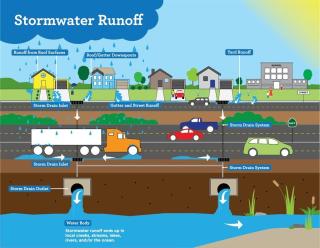Help us keep our stormwater clean

In order to direct the flow of rainwater and prevent flooding, the Town maintains a storm sewer system. Rainwater enters the storm sewer system through a grate in the street called a “catch basin”. Catch basins are connected to storm drains that discharge rainwater runoff directly into the nearest brook, river, pond or Long Island Sound. Each year DPW vacuums debris and disposes the spoils over the course of about 6 weeks, as well as doing repairs as needed.
We also rely on the help of residents to ensure the catch basins do the job they were intended to do!
Our daily activities can impact the health of our waterways.
Runoff occurs when it rains or when snow melts. Water washes over roads, parking lots, lawns, and sidewalks, removing oil, debris, soil, and fertilizer from those surfaces. The water and pollutants then flow directly into waterways, or into nearby storm drains and are carried—untreated—to our rivers, lakes, and oceans. These pollutants can contaminate water and result in shellfishing restrictions and beach closings.
In recent years, sources of water pollution originating from industrial and sewage treatment plants have been greatly reduced. If we want to continue to make progress, more effort is needed to control polluted runoff, such as oil leaking from cars or fertilizer washing off lawns. And remember, don't dump! Only rainwater should go down a storm drain. Let’s all do our part and keep our waterways clean.
YOU CAN HELP BE PART OF THE SOLUTION!
Below are some things every Stonington resident can do to prevent pollutants from getting into catch basins:
- More Plants, Less Pavement- Increase (native) plant cover
- Use Permeable Pavers- For your driveway or patio
- Sweep up and remove sand and litter from sidewalks and driveways to prevent these materials from being washed into a catch basin by snow melt or rainwater runoff. Never hose them into a catch basin.
- Check your car often for drips and oil leaks and fix them promptly. Use drip pans if necessary. Don’t hose leaks into a catch basin, use kitty litter or sand to absorb and dispose of in your household garbage.
- Compost or mulch yard waste. Don’t leave it in the street or sweep it into a catch basin. Leaves (no plastic bags or grass) may be brought to the Transfer Station for composting.
- Bring household products that contain chemicals, such as insecticides, pesticides, paint, solvents, and used motor oil and other auto fluids to a regional Household Hazardous Waste collection event. Never pour them onto the ground or into a catch basin.
- Use pesticides and fertilizers sparingly- or better yet, not at all! If you do use them, avoid applying them before a rainstorm, and use organic, slow-release fertilizers.
- Disconnect Downspouts- Direct roof runoff into plants or soil
- Scoop the Poop! Dispose of pet waste properly
- If you see a catch basin that is clogged or full, report it to the DPW for cleaning
You can learn more at: www.stonington-ct.gov/engineering/pages/npdes-phase-2-ms4-stormwater-per...

